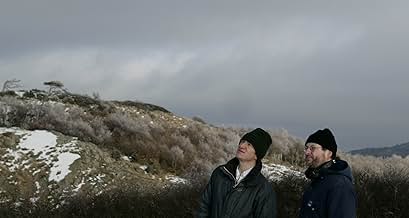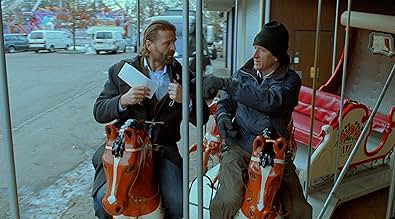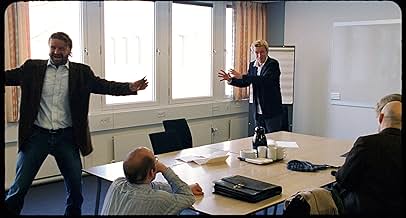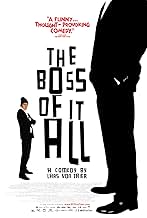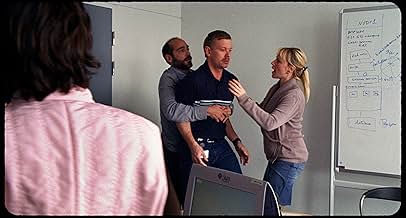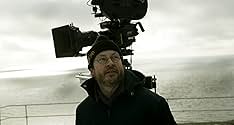CALIFICACIÓN DE IMDb
6.6/10
13 k
TU CALIFICACIÓN
Un actor es contratado para hacerse pasar por el presidente de una compañía cuando se decide ponerla a la venta.Un actor es contratado para hacerse pasar por el presidente de una compañía cuando se decide ponerla a la venta.Un actor es contratado para hacerse pasar por el presidente de una compañía cuando se decide ponerla a la venta.
- Dirección
- Guionista
- Elenco
- Premios
- 1 premio ganado y 7 nominaciones en total
Friðrik Þór Friðriksson
- Finnur
- (as Fridrik Thor Fridriksson)
Lars von Trier
- Narrator
- (sin créditos)
- Dirección
- Guionista
- Todo el elenco y el equipo
- Producción, taquilla y más en IMDbPro
Opiniones destacadas
What a wonderful surprise this film was! I never expected a pretty straightforward satire from von Trier and Dogme, but I certainly got it. The plot sounds well-used and obvious but the way it was transferred to a Scandinavian IT culture, the distanced approach to character writing, improvisation, and superb acting and direction made it a great comedy. On reflection, what was really hilarious was the massively over-inflated self-importance of each and every character. Ali G. and Borat could learn a few things from these Danes (and one very irate Icelander).
As the end credits voice-over said, "Apologies to those who expected more, and to those who expected less. The others got what they deserved". I was glad to be one of the others.
As the end credits voice-over said, "Apologies to those who expected more, and to those who expected less. The others got what they deserved". I was glad to be one of the others.
Last Sunday's cinema outing with my friends here in Rome yielded a very pleasant surprise - Von Trier's unique latest flick, surprisingly enough, a comedy. I've read some comments claiming that this was one of his weakest movies - I respectfully, but firmly disagree. In fact, I would argue that even as a comedy, and thus deprived of the devices that normally make drama seem more powerful, this packed a punch on a par with Dancer in the Dark or Dogville, if not more. If understated power, rather than human agony and melodrama layered on very thick is what you best respond to, you might like Direktøren for det hele more than any other Von Trier movie you've seen so far.
Right from the opening shot, we are made to look into the windows of a cold and desolate office building in some characterless and efficient modern suburb like hundreds of others. Meanwhile, a narrator reassures us that this movie is a comedy. As such, he says, we are allowed not to think - to let this just be brainless entertainment. Hearing a narrator in a Von Trier movie make such an introduction, you just know that what you're about to watch will be anything but mindless fun! In fact, on hearing this I shifted rather uncomfortably in my seat, wondering what the Master Misanthrope had in store for me this time.
The basic plot: When Ravn, an IT company owner decides to sell his business off to a moody and irritable Icelandic businessman, he hires an actor to pretend that he's the Boss of Bosses. The pally, "cuddly", bearded Ravn, vaguely reminiscent of Robin Williams, explains his decision by saying that when he'd founded the company, he had never felt strong and charismatic enough to take on the mantle of president. He always preferred to just blend in with the rest of the staff, while actually pulling all the puppet strings. He had always told his staff that the "real" big boss (obviously non-existent) resided in America and never came to Denmark. When Ravn eventually decides to sell the company, the fussy Icelandic businessman expects the "real" president to sign the contact. For this reason, Ravn is forced to hire Kristoffer, an out-of-work, egocentrical actor, among other things obsessed with the obscure playwright Gambini and convinced that Ibsen is a talentless hack.
Naturally, Kristoffer knows nothing about the company, about IT and Ravn simply asks him to "improvise". Cue some cringeworthy company meetings with Kristoffer talking absolute crap (with one irascible employee, the "country bumpkin", constantly lashing out at him with his fist!). Cue also some inevitable office politics, involving the company's employees reacting to their new-found, flesh-and-blood figure-head, on whom they hang all their hopes and frustrations.
If this sounds like a Danish version of the British TV series "The Office" (remade also in America), please think again - the movie goes well beyond milking the comic potential of a typical contemporary office environment. The wonder of this movie lies in the way in which it plays with ethical issues. I won't give anything more of the plot away, as this would entail spoiling its central twists and surprises. Among other things, this multi-layered, dark and cynical comedy, which had my friends and I chatting for a solid two hours after we left the cinema, is about responsibility and what it means to be truly ethical. Holding oneself accountable for one's actions - how do you deal with that when the insatiable need to feel loved and approved of takes over? The movie is also a wonderful illustration of the typical contemporary corporate environment, whereby the employee is subtly demeaned in being prevented from ever putting a face to those provoking their misery on the workplace. It poses questions on what leadership really means. It shows us how a human being will become blind to the needs of others when it comes to satisfying one's vanity and emotional fragility.
Naturally, as a Lars Von Trier movie this is not a movie that has much faith in humanity. However, unlike Dancer in the Dark, it does not gang up on the viewer with its misanthropy and dramatic bullying. Unlike Dogville, it doesn't present a world in which moral nihilism is the only reality. Unlike Breaking the Waves, it doesn't revel in victimising its lead character. It's far more subtle and multi-facetted in its arguments against human integrity, not to mention that it's laugh-out-loud funny (the whole cinema was in stitches), superbly acted and truly unpredictable. I also enjoyed the cinematography, strictly hand-held digital camera with a purposefully "rudimentary" editing. Highly recommended, on several different levels.
Right from the opening shot, we are made to look into the windows of a cold and desolate office building in some characterless and efficient modern suburb like hundreds of others. Meanwhile, a narrator reassures us that this movie is a comedy. As such, he says, we are allowed not to think - to let this just be brainless entertainment. Hearing a narrator in a Von Trier movie make such an introduction, you just know that what you're about to watch will be anything but mindless fun! In fact, on hearing this I shifted rather uncomfortably in my seat, wondering what the Master Misanthrope had in store for me this time.
The basic plot: When Ravn, an IT company owner decides to sell his business off to a moody and irritable Icelandic businessman, he hires an actor to pretend that he's the Boss of Bosses. The pally, "cuddly", bearded Ravn, vaguely reminiscent of Robin Williams, explains his decision by saying that when he'd founded the company, he had never felt strong and charismatic enough to take on the mantle of president. He always preferred to just blend in with the rest of the staff, while actually pulling all the puppet strings. He had always told his staff that the "real" big boss (obviously non-existent) resided in America and never came to Denmark. When Ravn eventually decides to sell the company, the fussy Icelandic businessman expects the "real" president to sign the contact. For this reason, Ravn is forced to hire Kristoffer, an out-of-work, egocentrical actor, among other things obsessed with the obscure playwright Gambini and convinced that Ibsen is a talentless hack.
Naturally, Kristoffer knows nothing about the company, about IT and Ravn simply asks him to "improvise". Cue some cringeworthy company meetings with Kristoffer talking absolute crap (with one irascible employee, the "country bumpkin", constantly lashing out at him with his fist!). Cue also some inevitable office politics, involving the company's employees reacting to their new-found, flesh-and-blood figure-head, on whom they hang all their hopes and frustrations.
If this sounds like a Danish version of the British TV series "The Office" (remade also in America), please think again - the movie goes well beyond milking the comic potential of a typical contemporary office environment. The wonder of this movie lies in the way in which it plays with ethical issues. I won't give anything more of the plot away, as this would entail spoiling its central twists and surprises. Among other things, this multi-layered, dark and cynical comedy, which had my friends and I chatting for a solid two hours after we left the cinema, is about responsibility and what it means to be truly ethical. Holding oneself accountable for one's actions - how do you deal with that when the insatiable need to feel loved and approved of takes over? The movie is also a wonderful illustration of the typical contemporary corporate environment, whereby the employee is subtly demeaned in being prevented from ever putting a face to those provoking their misery on the workplace. It poses questions on what leadership really means. It shows us how a human being will become blind to the needs of others when it comes to satisfying one's vanity and emotional fragility.
Naturally, as a Lars Von Trier movie this is not a movie that has much faith in humanity. However, unlike Dancer in the Dark, it does not gang up on the viewer with its misanthropy and dramatic bullying. Unlike Dogville, it doesn't present a world in which moral nihilism is the only reality. Unlike Breaking the Waves, it doesn't revel in victimising its lead character. It's far more subtle and multi-facetted in its arguments against human integrity, not to mention that it's laugh-out-loud funny (the whole cinema was in stitches), superbly acted and truly unpredictable. I also enjoyed the cinematography, strictly hand-held digital camera with a purposefully "rudimentary" editing. Highly recommended, on several different levels.
Lars von Trier's Danish-language comedy. It never interested me much, though I used to love von Trier (despite always acknowledging his numerous flaws). And it is definitely one of his least good films. If we ever find ourselves looking back at his career in the distant future, this one will not be mentioned much. It's about an out-of-work actor (Jens Albinus) who is hired by a company's CEO who is pretending only to be that company's lead lawyer (Peter Gantzler) to impersonate the mythical, unseen "boss of it all". Gantzler plans to sell off the company, as well as his employee's patents, to an Icelander (played by Children of Nature's director, Friðrik Þór Friðriksson), but he doesn't want to be identified as the guilty party, instead setting up this patsy to take the blame from his crazy co-workers (among whom is Iben Hjejle, whom you may remember from Stephen Frear's High Fidelity). The film is moderately amusing. Though many people seem to think von Trier's oeuvre consists mostly of tragedies, his work is more often darkly comic. The Boss of It All isn't nearly his funniest work. The Kingdom and The Idiots are both funnier, as is arguably Europa. Friðrik Þór Friðriksson actually provides most of the film's laughs as the thunderous, Dane-hating Icelander, recalling Ernst-Hugo Järegård's Dane-hating Swede from The Kingdom. But still, The Boss of It All is good, even if it will eventually just be a footnote.
If we consider this film only for the script, it is just (that's a lot) a brilliant comedy often trespassing into farce. What makes it different is the Von Trier branding, made of evident cuts (one every 3 or 4 seconds), bad framing, continuity mistakes too evident to be real mistakes. Lars underlines in a voice-off this camera mismanagement, but to me it was quite annoying after a while. The second thing that makes the otherwise mainstream comedy based on a clever and very funny idea is the fact that it is oh so Danish. These northerners are very strange and funny to me: I mean, we are used of the American, British or (for me) Italian or French and now also Spanish ways of making us laugh, but those sad and pale faces dimly lit by the Nordic sun are so funny and different and crazy. Also the jokes between the Danish people and a raging Icelander citing sagas and verbally abusing the Danish who "kept Iceland under their heel for 4 centuries" are very exotic but perfectly enjoyable. The impression is sometimes to be watching a madhouse, but it's a different experience I would recommend.
This will be a little hard to understand, for those who are not familiar with Scandinavian office culture and enterprise democracy. For those who are, it's funny.
The unemployed actor gets a job. He's supposed to act as executive, during some sensitive business with an Icelandic buyer. It doesn't develop like he has imagined, but in fact it doesn't develop like anyone has imagined.
There's lots of kicking here in every direction and not at least against cultural snobbism. It's von Trier back to the basics, but not that easy to grip for people outside a Scandinavian environment.
The unemployed actor gets a job. He's supposed to act as executive, during some sensitive business with an Icelandic buyer. It doesn't develop like he has imagined, but in fact it doesn't develop like anyone has imagined.
There's lots of kicking here in every direction and not at least against cultural snobbism. It's von Trier back to the basics, but not that easy to grip for people outside a Scandinavian environment.
¿Sabías que…?
- TriviaThis movie is shot with camera technique called Automavision, an innovation in which the camera angles and movements are selected by a computer. The media notes explain technique, "a principle for shooting film developed with the intention of limiting human influence by inviting chance in from the cold". There are odd framings and jump cuts within scenes making everything seem a bit unsettled.
- ConexionesFeatured in Smagsdommerne: Episode #4.16 (2006)
Selecciones populares
Inicia sesión para calificar y agrega a la lista de videos para obtener recomendaciones personalizadas
Detalles
Taquilla
- Presupuesto
- EUR 3,000,000 (estimado)
- Total en EE. UU. y Canadá
- USD 51,548
- Fin de semana de estreno en EE. UU. y Canadá
- USD 7,855
- 27 may 2007
- Total a nivel mundial
- USD 3,111,395
- Tiempo de ejecución1 hora 39 minutos
- Color
- Mezcla de sonido
- Relación de aspecto
- 1.85 : 1
Contribuir a esta página
Sugiere una edición o agrega el contenido que falta

Principales brechas de datos
By what name was El jefe de todo esto (2006) officially released in Canada in English?
Responda

